You made the turkey. Now what do you do with the bones? Make turkey stock. It’s a super savvy way to make something from nothing!
What you end up with a super rich and flavorful “bone broth” that you can use in soups, stews, and rice dishes.
Want to save this post?
Enter your email below and get it sent straight to your inbox. Plus, I’ll send you budget recipes and money-saving tips every week!
Okay friends. Thanksgiving approaches. And with it the inevitable question that has plagued home cooks and wannabe cooks for decades:
what do I do with the turkey bones?
Your gramma knew what to do with it. Heck, my gramma knew how to raise and kill that turkey!
But, in an era when we’re so far removed from our food sources and folks might roast a chicken or a whole turkey once or twice a year, you might feel that you need a refresher.
This is that refresher, just in time for your Thanksgiving or Christmas turkey — but a method that can be used even on a random day when you bring home a Costco rotisserie chicken!
Learning to make stock from turkey bones can be a valuable skill in the kitchen, one that allows you to make tasty bone broth or stock from stuff that might otherwise get chucked. Often called “liquid gold” for its color and valuable health properties, turkey stock is easy to make and packed with flavor and nutrients.
As the leftovers of a roast turkey, that is the bones and drippings simmer in water and aromatics, magic happens. Something that looks like nothing becomes a flavorful, hot stock to use in soups, stews, chilis, and rice dishes.
If you’re roasting a turkey this season or even turkey pieces, be sure to make stock from turkey leftovers!
Why Do This
It helps you avoid food waste and save money. Making a homemade stock from turkey is one of the most economical things you can do. Essentially, you’re getting all the flavor you possibly can from something you might otherwise chuck. Why buy canned or boxed broth when you can make it for practically free?
Making stock from turkey is super easy! Stock is also one of the easiest culinary feats you can pull off. This recipe is really a non-recipe. As long as you have turkey bones and water, you can change it up based on what vegetables and herbs you have on hand.
Stock from turkey is delicious. The resulting turkey stock adds rich flavor to soups, stews, sauces, and rice dishes. It’s richer than chicken stock, so you can even dilute it to stretch your savings even farther.
Ingredients
Here’s what you’ll need to make stock from turkey:
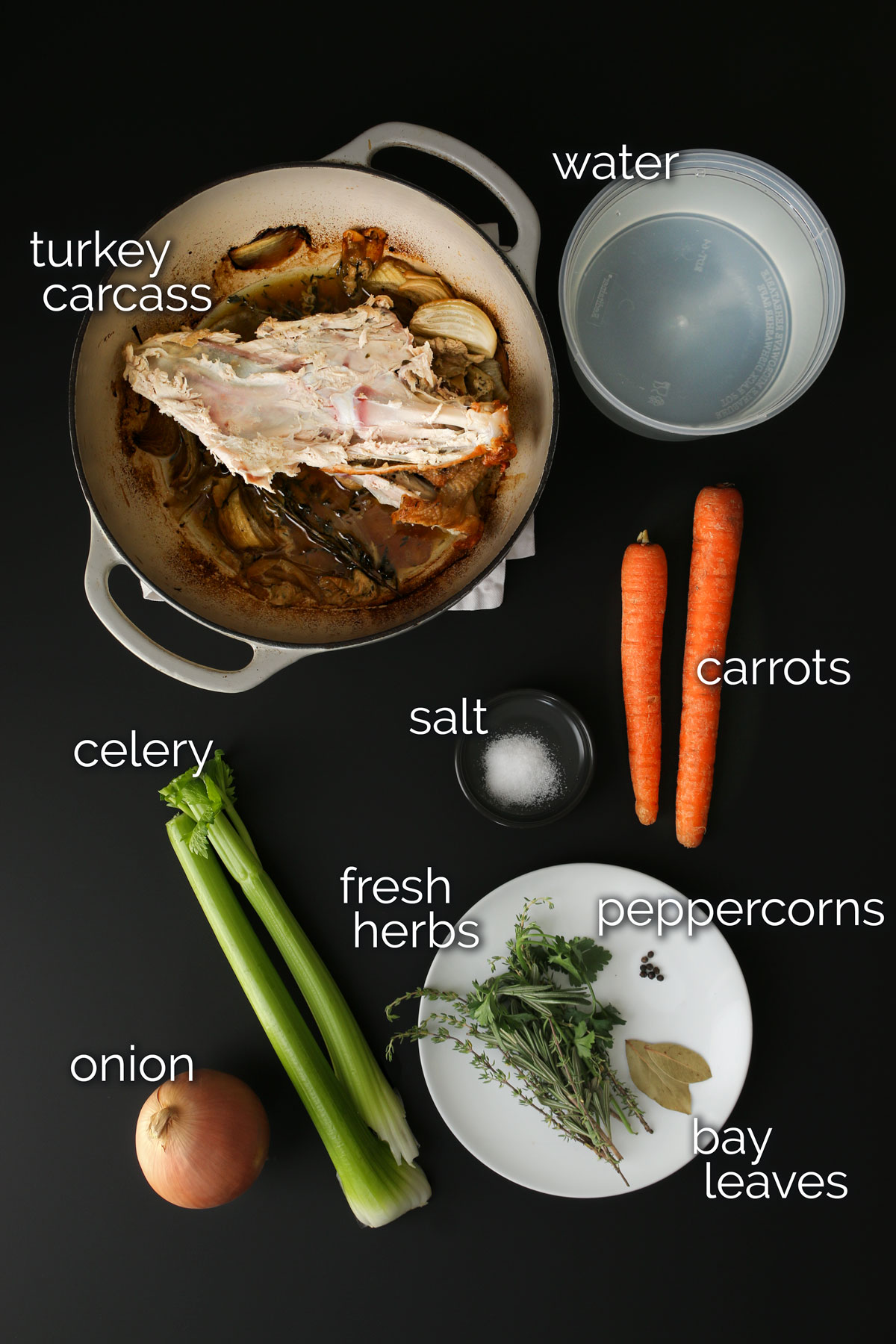
the turkey carcass – This includes turkey bones, skin, and drippings from a roast turkey carcass or roast turkey legs or turkey breast. Remove as much meat as possible to use in turkey recipes.
onion – you can also use leeks or shallots if that’s what you have.
carrots – You can use whole carrots, scrubbed and cut into chunks or baby carrots.
celery – Use any part of the celery stalk, including the ribs and inner leaves.
bay leaves – They may seem insignificant, but there is a point to bay leaves. They add a subtle but significant flavor to turkey stock.
salt – Try not to compare stock from turkey with commercial chicken broth which gets most of its flavor from salt and additives. That said, taste and add more salt as needed to suit your preferences.
peppercorns – Whole peppercorns add flavor without clouding up your turkey stock.
water – Use cool, filtered water for the best tasting stock.
fresh herbs – Use what you like, such as sage, thyme, parsley, or rosemary
Varations
Stock is a great way to get value from some of the sadder looking vegetables in the crisper. Feel free to add mushrooms, garlic, or parsnips if you already have them on hand. You can also add dried chiles, fresh ginger, white wine, and/or apple cider vinegar.
Avoid adding peppers, potatoes, or cruciferous vegetables.
Step-by-Step Instructions
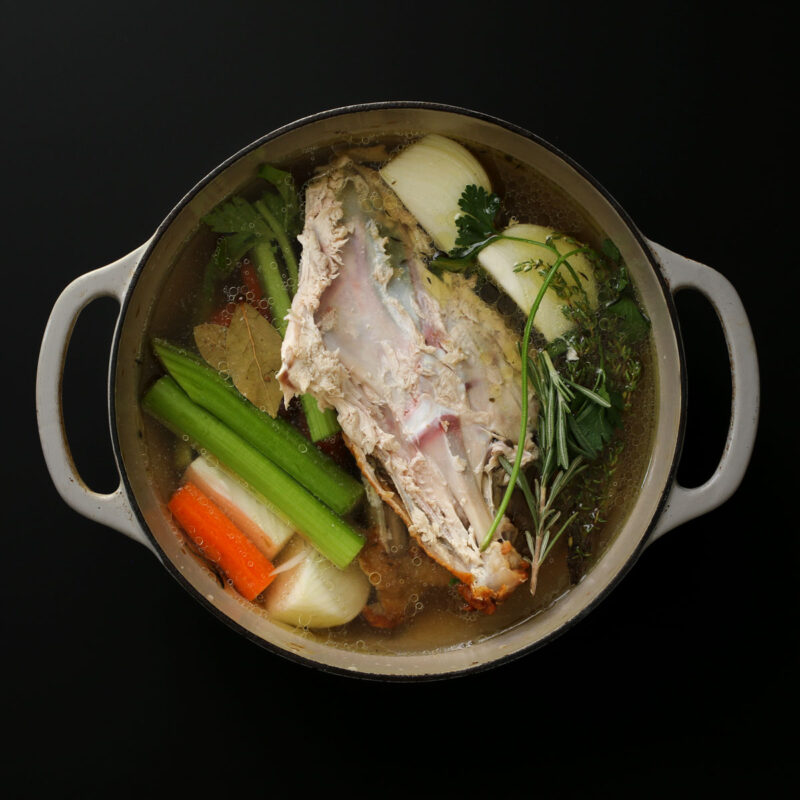
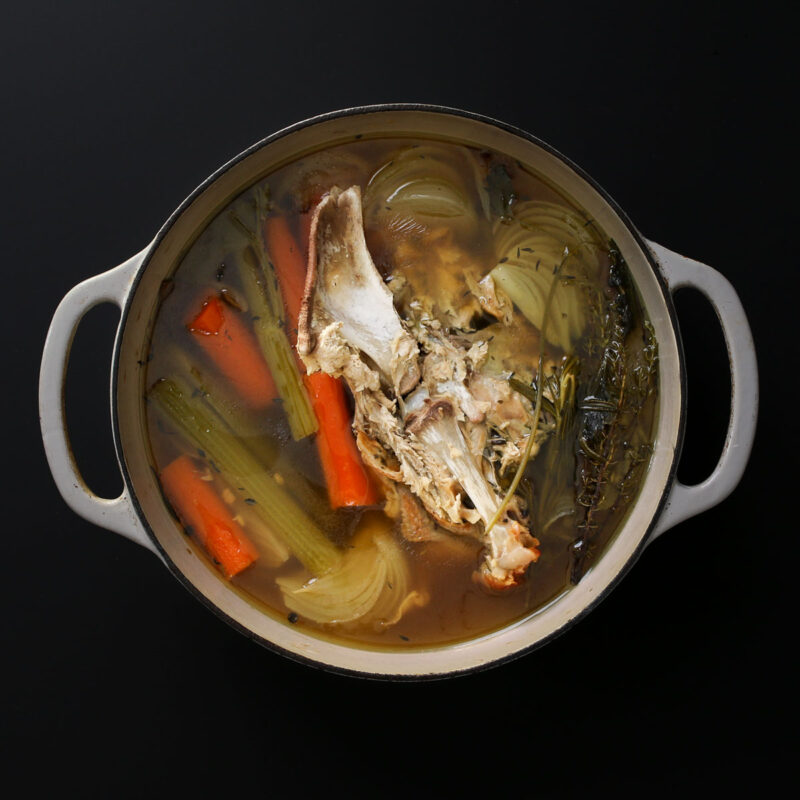
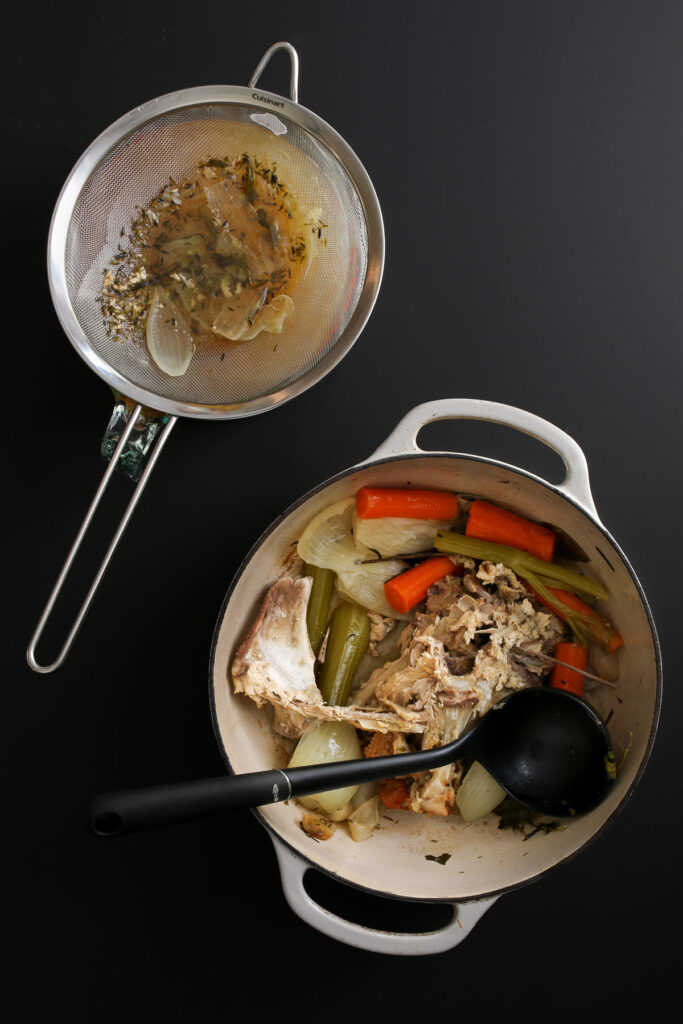
To make it on the stovetop:
- Place the turkey bones, onion, carrots, celery, bay leaves, salt, peppercorns, and optional herbs in a heavy stockpot or dutch oven. Add enough water to fill the pot with a few inches headspace. Cover and simmer for 3 to 4 hours.
To make it in the slow cooker:
- Place the turkey bones, onion, carrots, celery, bay leaves, salt, peppercorns, and optional herbs in the slow cooker. Add enough water to fill the pot ?. Cover and cook on low 6 to 8 hours.
To make in the electric pressure cooker:
- Place the turkey bones, onion, carrots, celery, bay leaves, salt, peppercorns, and optional herbs in the electric pressure cooker. Add water to the fill line. Cover and secure the lid. Close the pressure valve and cook on manual for 40 minutes. Allow the pressure to release naturally.
Once the stock has simmered:
- Strain the stock through a sieve, pressing on solids to release all the liquid.
- Chill in the refrigerator. As the fat rises to the top and solidifies, you can remove this and discard.
- Use in your recipe or freezer for longer storage, up to 2 months in a standard refrigerator freezer.
Go for the bonus round
Once your stock is cooked and strained, you can make a “second press” of stock by adding more water to the solids in the pot and going for another round.
This stock won’t be as flavorful as the first batch, but it will still be good. And you’ll be grabbing every last bit of flavor from the ingredients.
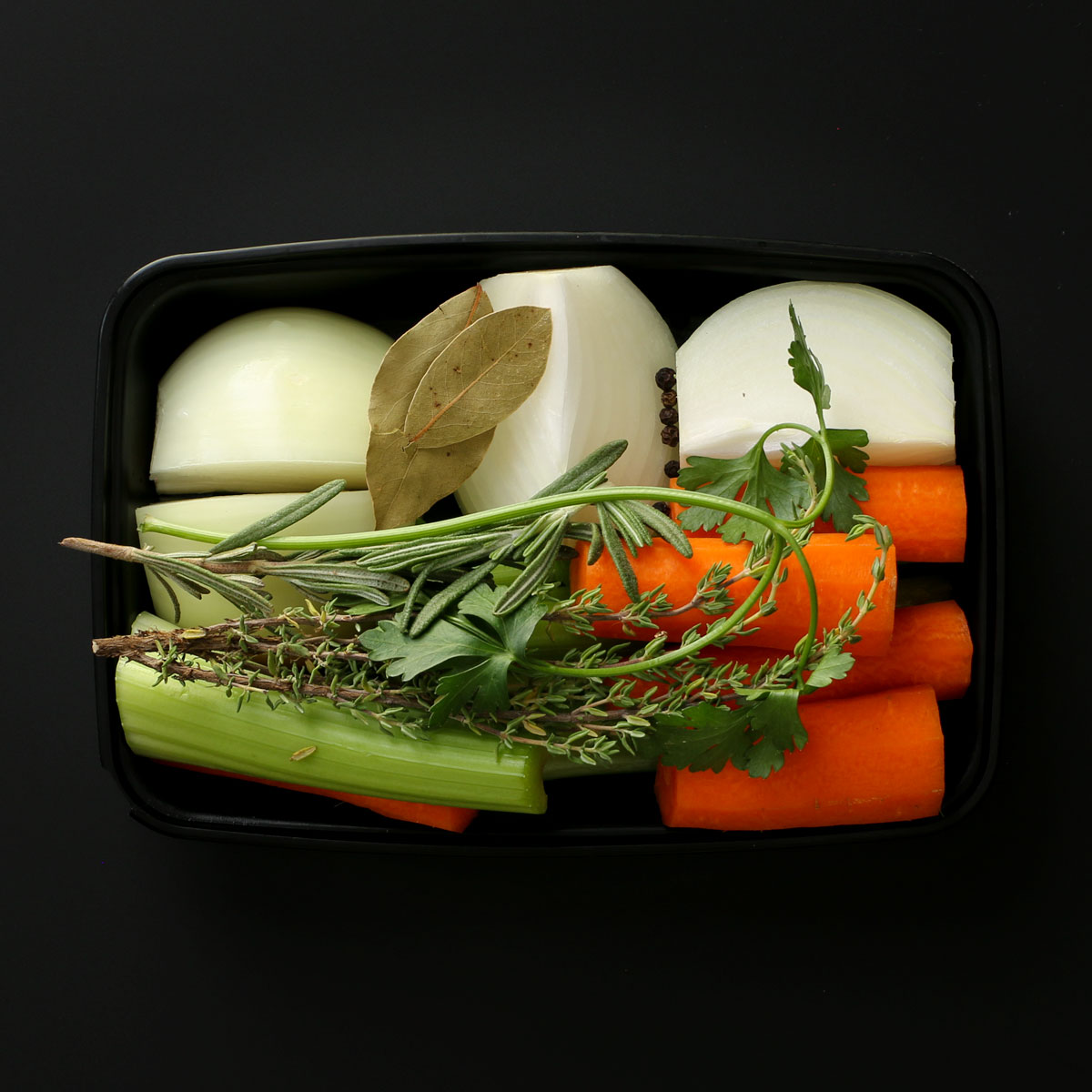
Make-Ahead Trick
When you’re prepping a festive meal, you probably plan to make stock from turkey leftovers, but after all the kitchen work, you may find yourself too tired to mess with the carcass and make stock. Do I have to drag out the cutting board again?
Prep a stock box! Prior to the meal while you’re already chopping herbs and aromatics, set aside the ingredients you need to make stock from turkey and place them in a small, airtight container in the fridge.
After the meal when you’re putting away leftovers, pull out the stock box, toss the contents into the slow cooker with the turkey bones and water — and just walk away!
It’s super simple and a great way to make stock from turkey when you’re too pooped to party.
How to Store Turkey Stock
Store homemade turkey stock in covered containers in the fridge for up to 4 days.
For making it ahead, freeze in freezer-safe containers, leaving room for expansion. Freezing your stock will then make for a quick weeknight soup.
Since stock is mostly water, it can take up a lot of space in the freezer. To save space, you can reduce it by simmering for an hour or so. The stock will become more concentrated and less in volume. You can dilute it with water later when you use it.
FAQs
Turkey stock will gel if you’ve cooked the bones in the stock which releases collagen into the stock. This is perfectly natural and a sign of a good quality stock.
If you make a second press with the same bones, you will have less gelling.
The ingredients in turkey stock, vegetables and herbs, are all naturally gluten-free. Provided that the turkey itself wasn’t cooked with a gluten ingredient, such as flour, soy sauce, or beer, the stock made from it should be gluten-free. Be sure to read all ingredients to be sure there’s no risk of cross-contamination.
Turkey stock is an excellent thing to freeze. Once you’ve strained it, divide it into 2-cup portions and chill in the fridge. When it’s very cold, you can transfer it to the freezer. Be sure to label the containers so you know what it is once frozen.
Turkey stock has a delicious rich, meaty taste. It’s typically more flavorful than chicken stock, so you may want to dilute it for recipes. That will stretch your investment of “liquid gold”.
Be sure to taste it and season it well with salt if needed. If it tastes greasy, chill the stock for a few hours. This will cause the fat in the stock to rise to the top and solidify. You can remove it creating a cleaner tasting stock.
Per USDA guidelines, food left at room temperature for longer than 2 hours should be discarded, so turkey stock is not good if left out overnight.
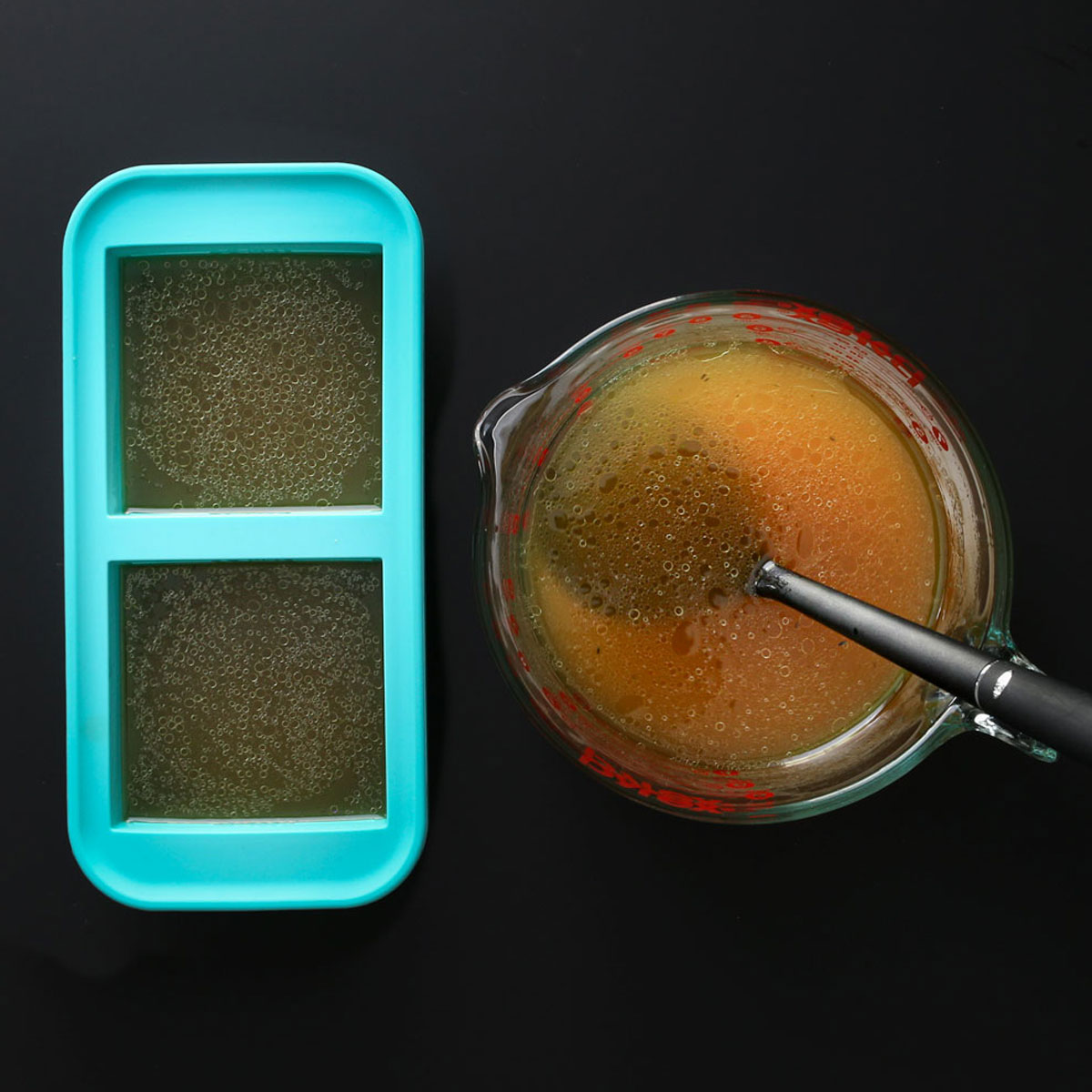
How to Use Turkey Stock
You can use homemade turkey stock in recipes calling for chicken stock, such as the following:

Tell us what you think!
We love to hear your experiences with Good Cheap Eats. Click the STARS on the recipe card or leave a STARRED comment to let us know what you think of the recipe.

Turkey Stock
Equipment
- 6-qt oval slow cooker
- dutch oven
- fine mesh sieve
- soupercubes
- single-serve airtight containers
- soup ladle
Ingredients
- bones, skin, drippings from a roast turkey carcass (smaller pieces are fine, too, like breasts or legs)
- 1 onion quartered, can also us a leek, sliced
- 2 carrots cut into chunks
- 2 ribs celery cut into chunks
- 2 bay leaf
- 1 teaspoon salt or more, if desired
- 8 to 10 peppercorns
- 8 to 12 cups water
- optional fresh herbs, such as sage, thyme, parsley, or rosemary
Instructions
To make it on the stovetop:
- Place the turkey bones, onion, carrots, celery, bay leaves, salt, peppercorns, and optional herbs in a heavy stockpot or dutch oven. Add enough water to fill the pot with a few inches headspace. Cover and simmer for 3 to 4 hours.
To make it in the slow cooker:
- Place the turkey bones, onion, carrots, celery, bay leaves, salt, peppercorns, and optional herbs in the slow cooker. Add enough water to fill the pot ⅔. Cover and cook on low 6 to 8 hours.
To make in the electric pressure cooker:
- Place the turkey bones, onion, carrots, celery, bay leaves, salt, peppercorns, and optional herbs in the electric pressure cooker. Add water to the fill line. Cover and secure the lid. Close the pressure valve and cook on manual for 40 minutes. Allow the pressure to release naturally.
Once the stock has simmered:
- Strain the stock through a sieve, pressing on solids to release all the liquid.
- Chill in the refrigerator. As the fat rises to the top and solidifies, you can remove this and discard.
- Use in your recipe or freezer for longer storage, up to 2 months in a standard refrigerator freezer.
Notes
Nutrition
This post was originally published on November 25, 2013. It has been updated for content and clarity.


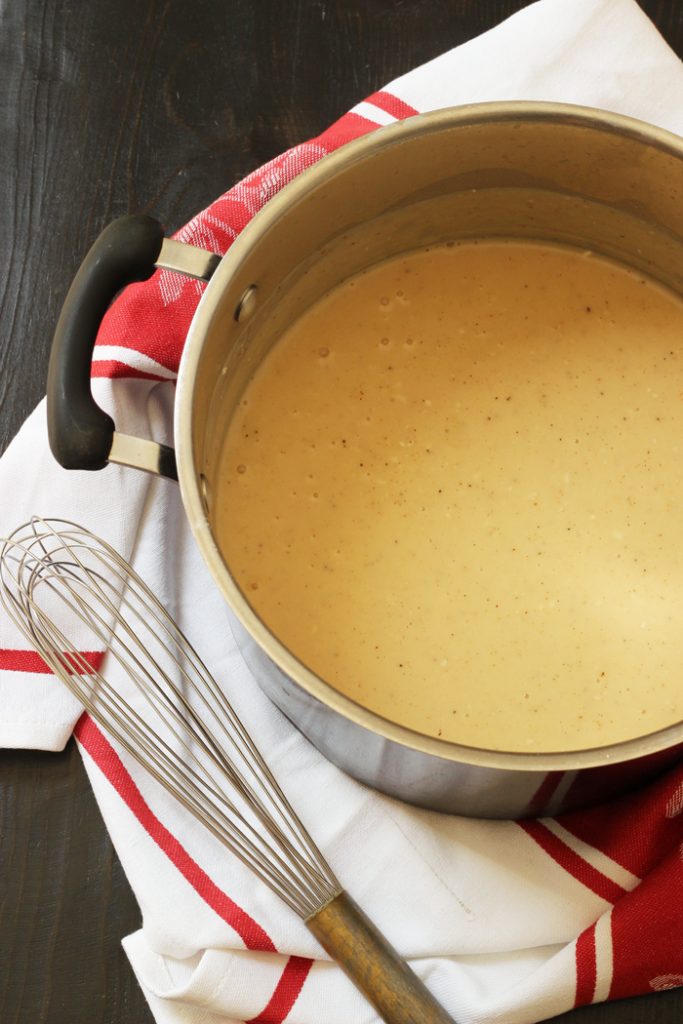
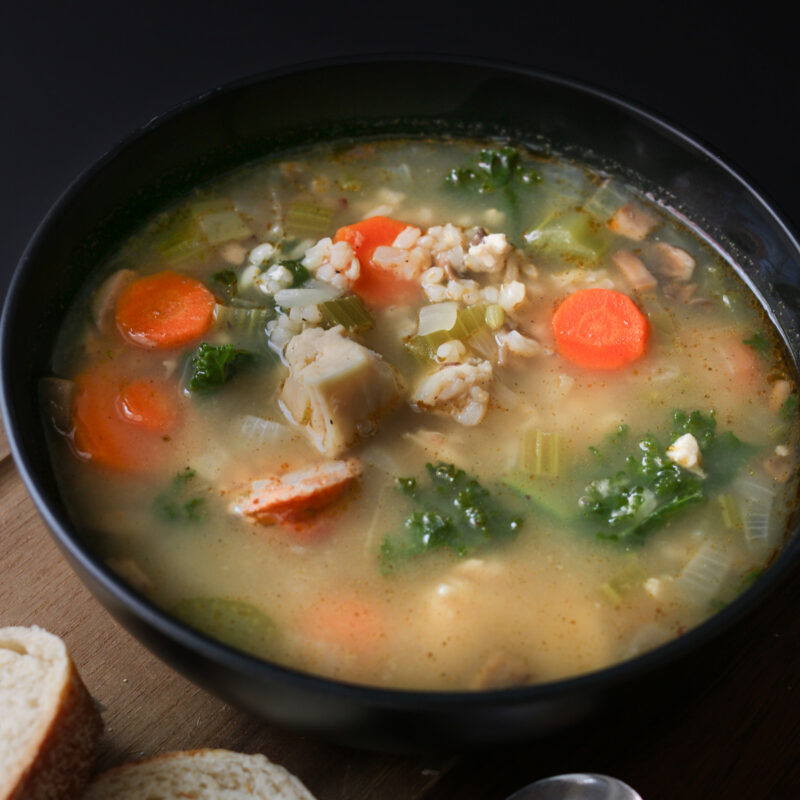

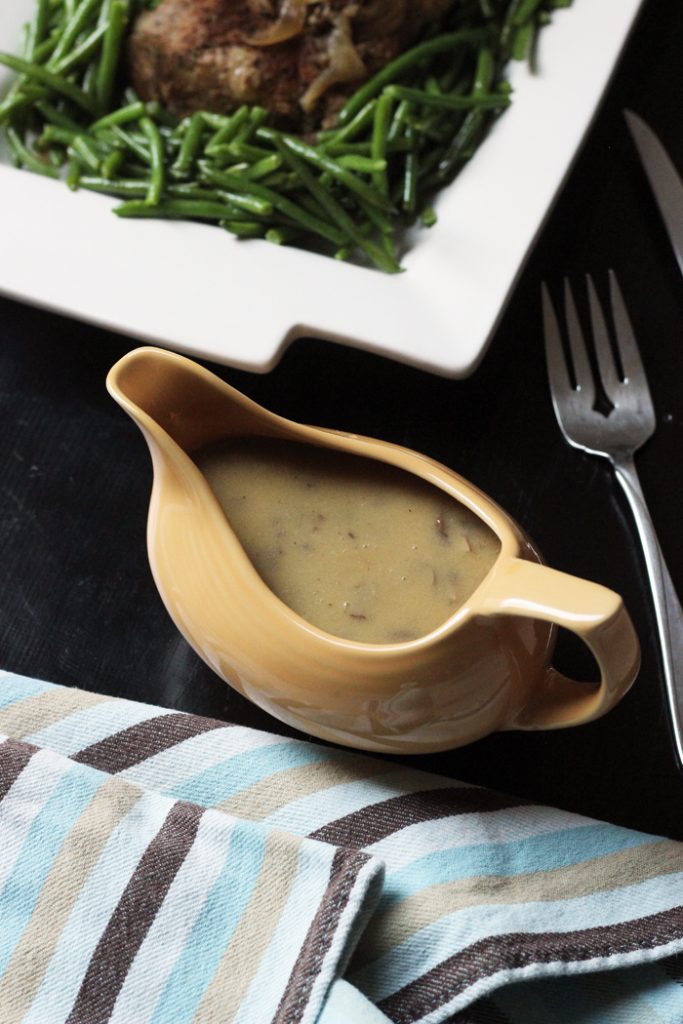

Martha
Can this made with uncooked turkey pieces? I boned a turkey breast and have the bones with scraps of raw meat!
Jessica Fisher
Yes that’s fine. The meat will cook in the long simmer.
Jenny
Can’t I just use this for soup tonight if I take the bones out?
Add some noodles to it and have turkey noodle soup?
Jessica Fisher
Yes, strain it and you’re good to go.
Lee Hernandez
If you want clear broth, here is a nifty trick I use from my Better Homes and Gardens red gingham cookbook. When you are all done with your recipe, you put the broth back into a big pot. In a small bowl, mix 1/4 cup water, 1 egg white, and one eggshell, crushed. Add this to the stock; bring to a boil. Remove from heat; let stand 5min. Strain again thru a sieve lined with cheesecloth. When I have tried this, the broth was as clear as tea. Strange process, but great results.
Jessica Fisher
Thanks for the tip!
TSandy
Jessica I’m in the process now of cooking your turkey stock recipe. I had the remnants of a 22lb turkey and couldn’t even fit all the bones, water, vegies etc in the crockpot. My turkey carcass completely filled a Ziploc gallon size bag squished down. How much turkey carcass do you suggest to put into the crockpot when you make stock?
Jessica Fisher
That is a great problem to have! I would do 1/2 or 1/3 and then you can freeze the rest and make stock a different day. 🙂
Davina Gilroy
Thank you for your chick stock reciepe, I have been making it since I began following your blog. I use it to make to mashed potatoes last year for Thanksgiving and I was requested to make them again this year.
Jessica Fisher
Great! So glad to hear that it’s worked well for you!
Brighid
So what do you do with the giblets? Inquiring minds want to know… 🙂
Jessica Fisher
When I have the whole turkey, I do this: http://lifeasmom.com/2008/11/recipe-swap-thanksgiving-side-dishes.html
Brighid
Thanks! Your post is bookmarked and ready to go for broth making on Friday. Perhaps it should be called Repurpose Leftovers Friday or OMG There’s Mountains of Food Friday. 🙂
TSandy
Space in my two freezers are prime real estate. I always buy 3-4 turkeys during Thanksgiving sales and cook those throughout the year. One day the lightbulb went on and I realized that cooked turkey frozen took up a whole lot less space than whole raw turkeys. So the last two years in the days after Thanksgiving are filled with cooking turkeys in my Nesco. Then I make up freezer bags of turkey for various uses. No more jumbo frozen turkeys just taking up valuable freezer space.
Melissa W
This may seem kind of skimpY of me, but I hate wasting entire carrots and stalks of celery that I’ll just throw away. Instead, I keep a zip-top bag in the freezer for “soup veggies”. In it, I throw the tops and ends of carrots, celery, onions, garlic, bell peppers, or anything that sounds good. I add a bag or two of those to my crock pot instead. That way I’m getting the flavor from vegetable parts I would have thrown away, too.
Jessica Fisher
It’s a great strategy!
CeCee
I do the exact same thing!!! I also have a bag for Chicken scraps because we mostly purchase bone in skin on Chicken breast. Then when I have enough scraps… Tahhhdahhh. Soup
Jenny
That is a great idea!
Angela
Not skimpy at all! Very smart and useful tip that helps cut down on so much food waste! Gonna start doing this! Thanks for sharing!
Diinaus
When things are tight once I’ve strained the stock the inedible bits ie onion skins and hard bones are removed. The rest of the ingredients are pulsed in the blender and added back to the soup pot to stretch the meal further by adding fibre